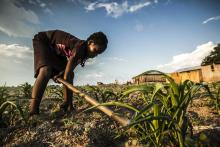While Russian President Vladimir Putin’s invasion of Ukraine [and Western sanctions on Russia] has exacerbated this crisis, climate change and capitalism are the primary engines behind this global food emergency. The IPCC has estimated that by 2030, global warming will have diminished the world’s average agricultural production by more than a fifth. This process really took shape during the so-called “Green Revolution” in the late 1960s. This movement was a collaboration between India and the U.S. (with USAID and the Ford Foundation being key actors). This shift towards big agriculture and more profitable monocultures made small farmers more dependent on expensive chemical fertilisers, forcing them into ever greater levels of debt. Structural adjustment programmes (SAPs), introduced by the World Bank coerced poorer countries into privatising their public sectors and reducing their welfare mechanisms. Adhering to strict policy packages in nearly every key sector – from agriculture to education and healthcare – became compulsory in exchange for any future loans from the bank or the IMF. SAPs meant indebted countries across the Global South had to convert from prioritising indigenous crops that the local population depended on, to producing cash crops for export. Despite occupying less than 25 percent of the world’s farmland, small-scale farmers provide 70 percent of the world’s food.
This article was originally published by Progressive International on 11.08.2022.

